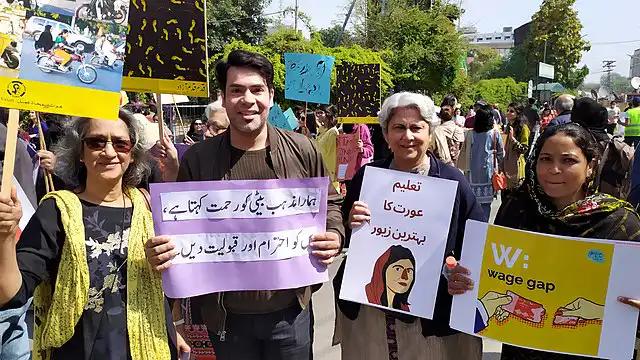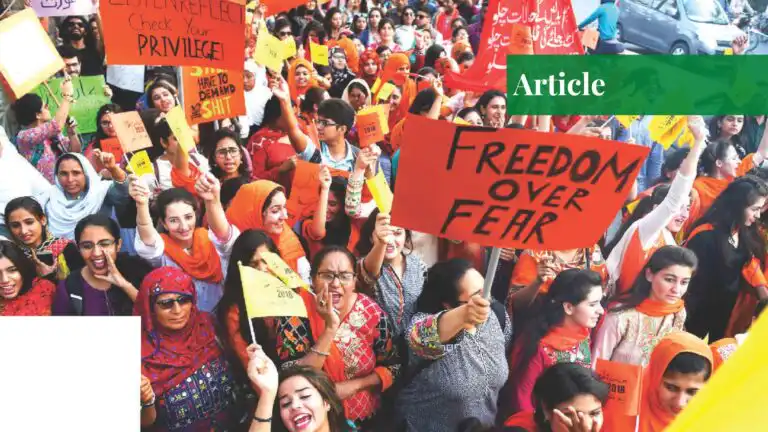Momina Areej is currently pursuing an MPhil in Clinical Pharmacy Practice. With a passion for writing, she covers diverse topics including world issues, literature reviews, and poetry, bringing insightful perspectives to each subject. Her writing blends critical analysis with creative expression, reflecting her broad interests and academic background.
Feminism, the ideology of gender equality, has often been reduced to a controversial word in Pakistan. Though the cause is noble, it gets such extreme reactions across the spectrum, from fervent support to utter disdain, that it becomes hard to pin down. On traditional grounds, it is perceived by many people in this part of the world as a Western-imported agenda to undermine their values and drive a wedge between men and women. Sadly, such misconceptions misrepresent the main tenets of feminism, prove to promote patriarchy and hinder meaningful discourse on women’s rights in the country. Consequently, any discussions on gender equality and equal rights get mired in the cultural and ideological walls that keep any further progress toward a more just and equitable society at bay.
The author intends, in this article, to elucidate upon these misinterpretations and show how much more compatible feminism is with Islamic teachings. Both are complementary, forming an inclusive and equitable society in Pakistan in which women’s rights are viewed as a key ingredient of social justice.
The Misconception: Feminism as a Threat to Men and Culture
Many people in Pakistan believe feminism to be, by definition, anti-men. This stems primarily from notions of misandry, namely a hatred or disdain for men, which most often blights the true essence of feministic values. At the core of feminism is the establishment of equality across all genders and the disintegration of systemic inequalities therein; this, however, is never intended nor implied to be a switch between the power dynamics, placing women at the top. The essence of feminism revolves around justice, equity, and balance; thus, it actively resists any system that aims at inhibiting people’s potential wherein the alleged system of inhibition usually depends on sex or gender-stratified norms.
Patriarchal-based paradigms in Pakistan not only regard themselves as a tool for such duplicitous bondage, but they burden the man or subject him to impossible expectations. In some ways, the system finds men privileged, while in others, it expects extravagant responsibilities of a man. Men become imprisoned by roles and notions of masculinity; they are not supposed to show emotional vulnerability. This imprisonment not only curtails the growth of men but also sues poison that reverberates throughout society. This rigidity has filled men with roles that some women are battling against through feminism by sharing assignments with men and doing away with the ugly piece of manly masculinity and hope.
The very perception of feminism as foreign or Westernized gets in the way of its acceptance in Pakistan. Many critics accuse feminist advocates of pushing through foreign values that, through their very nature, hurt rather deeply the religious and cultural morality of this society. Perhaps the counter-position arises from ignorance of the excessive universality of the subject of feminism in a globalist aspect.
The Aurat March
The yearly Aurat March (Women’s March) clashes with this vested perception. Designed to outline issues concerning gender-based violence, workplace-related harassment, reproductive rights, and unequal access to opportunities, the march is a grouse of controversies. Today’s supporters see it as one of the much-needed openings to debate systemic injustices while, for the other party, it appears to have begun posing a threat to the family structure.

Mera Jism Meri Marzi
Slogans like Mera Jism, Meri Marzi (My Body, My Choice) are easily distorted. Critics see this as an excuse for an immoral pursuit, somehow losing the essence thereof. It talks about bodily autonomy and that it is nobody’s right to hurt and/or control one’s body, be it through any form of domestic violence or harassment, or through denial of reproductive rights. The line speaks for human dignity at its core and is not inherently contradictory to the ideals of Islam. The reaction toward such slogans indicates society’s reluctance to accept uncomfortable truths regarding the enormity of the abuse and inequality that behave as house pests.
The concept of feminism has been tagged as “anti-culture” in Pakistani society due to the fear of change involved. Many traditionalists equate the preservation of culture with maintaining the existing gender roles and, hence, any deviation from these norms is said to threaten social stability. Yet culture is not static; it changes with time. Feminism does not plan to wipe off the cultural identity, rather there are attempts to make right, what has been wrong with it.
In this background, the misconceived perception of feminism as an imported ideology has produced an ideological stalemate. Bringing the state out of this impasse would require dialogue and education on the very consideration of feminism within the culturally and religiously disambiguated perspective of Pakistan.
Feminism and Religion: A False Dichotomy
Perhaps one of the most pronounced myths and one that has taken deep roots in Pakistan is that feminism is inherently antagonistic towards religious values. With religion being the cornerstone behind the construction of a person here and societal identity, any movement thus perceived as standing contrary to Islamic principles gets skittish resistance. Feminism is often termed as a threat to those values, thus fueling the idea that it is essentially a Western flavor far from Islamic teachings. But the very narrative casts aside an obvious truth: Islam talks of women being valued and dignified, empowered, and ultimately equal to men.
This supposed dichotomy between feminism and religion is more born of patriarchal interpretations of Islamic texts than of religion itself. Most of these interpretations have long been invoked to justify discrimination against girls and women. However, there is a strong basis for women’s rights precisely in the scriptures and practices of the Prophet Muhammad (PBUH).
Islamic Feminism: A Harmonious Perspective
Islamic feminism is the bridge between feminist advocacy and religious identity. Fundamental to this belief is that Islam has ensured gender equality and that all oppressive practices arise from cultural misinterpretations, not divine ordination.
Equality in the Islam – Quran and Hadith
The Quran affirms the principle of equality. Allah announces in Surah Al-Ahzab (33:35):
“Indeed, the Muslim men and Muslim women, the believing men and believing women, the obedient men and obedient women, the truthful men and truthful women, the patient men and patient women… Allah has prepared for them forgiveness and a great reward.”
What this verse indicates is that the men and the women are equally capable of attaining righteousness and receiving praise. It denies notions of spiritual superiority based on gender, saying that everyone shall be tested the same way.
The Quran consistently addresses both genders in matters of moral behavior, religiosity, and virtuous deeds, stressing their common responsibility in the establishment of a just and ethical society.
Other than spiritual equality, the Quran also supports women’s social and economic rights, which were revolutionary at the time of its revelation. For instance, Surah An-Nisa (4:7), states:
“For men is a share of what the parents and close relatives leave, and for women is a share of what the parents and close relatives leave, be it little or much—a determined share.”
It contradicts the pre-Islamic Arabian tradition of denying women the right to any inheritance. It maintained financial independence and ownership for women, opening up a path for the empowerment of women in society.
Challenging Misinterpretations of Feminism in Islam and Pakistan
Yet, patriarchal misinterpretations of Islamic homilies often eclipse any inherent advocacy for equality within the teachings of Islam. The major factor making those misunderstandings is that these cultural practices come into mind when shoving distinct and unique Islamic teachings down our throats in a bid to make the oppressive traditions present in the guise of Islam.
A common example of such distortion is in the interpretation of the term qawwam in Surah An-Nisa (4:34):
“Men are the qawwamun (protectors) and maintainers of women because Allah has given the one more (strength) than the other, and because they support them from their means.”
The most frequently misquoted part of this verse is, the rationale for male supremacy, which seems to have been clouded in little or no concern for the context under which it was revealed. The term qawwam does not mean superior; it means responsible. It is an acknowledgment of their duty as providers and protectors of women in a then male-dominated echelon of income earners in society. It does not imply women’s inability to live as free women or another notion indicating men have higher command or rule over women. It establishes a sort of care framework; and accountability on either side.
The Taboo of Sexual Health – A Norm in Pakistan
The right to sexual health represents a very important yet rather neglected component of gender equality, viewed through the lens of cultural taboos. Quite fundamentally, feminism, given its premise of bodily autonomy and rights, provides one such unique arena wherein it attempts to introduce discussions on healthy sexuality, education, and access to sexual health services. Here discussions on sexual health, especially those pertaining to female health, find themselves steeped in taboo. Silence surrounding these issues works to entrench other dubious myths leading to worse health outcomes and greater vulnerability to exploitation, disease, and violence in women’s lives.
Reproductive rights such as menstrual health and sexual education are a few examples of discussions that see the least participation even among family members or healthcare systems. Such unwillingness to talk about women’s rights regarding sexual health has not only heightened ignorance but also created chains of cultural myths that further enhance the veil of shame and mystery surrounding basic biology concerning menstruation or childbirth.
Another raging issue it aims to appraise is the dire need for comprehensive sexual education in schools, which is virtually absent from the curricula in Pakistan. In a society where, for the most part, sex and reproduction are learned through unreliable sources like peers, the media, and unmonitored social media usage, a lack of camp education produces gaps of ignorance that can be dangerous. This allows unsafe sexual practices to persist, leading not just to unintended pregnancies and increased levels of STIs in the populace but also to the perpetuation of harmful gender norms and misconceptions regarding consent.
Reproductive rights ensure access to contraception, safe abortion services, and maternal healthcare, all of which remain central issues in feminist discourse on sexual health. Many women here lack access to family planning resources. This situation is caused primarily by restrictive laws and social stigma. Feminism has further pushed; advocates for reproductive justice still push on policies that allow women to develop, choose when and if to plan a family, have safe and affordable health care that is non-judgmental, and have comprehensive prenatal or postnatal care to protect both mother and child.
Is there a Future for the Feminist Movement in Pakistan?
There is more to feminism in Pakistan than what has often been presented by the media. It’s neither anti-men nor anti-religion; but a clarion call for justice, equality, and respect for both genders. By acknowledging the significance of Islamic feminism, Pakistan can prove that insistence on women’s rights is not a break from religious teachings but rather a fulfillment of such teachings. Islamic feminism is a way of combating the quest for gender equality based on values that are deeply entrenched in the fibers of society; that very dispel culture and break the barriers for a more inclusive narrative, where there is space for voices from all walks of life, be it urban or rural, male or female, religious or secular.
If you want to submit your articles and/or research papers, please check the Submissions page.
The views and opinions expressed in this article/paper are the author’s own and do not necessarily reflect the editorial position of Paradigm Shift.






